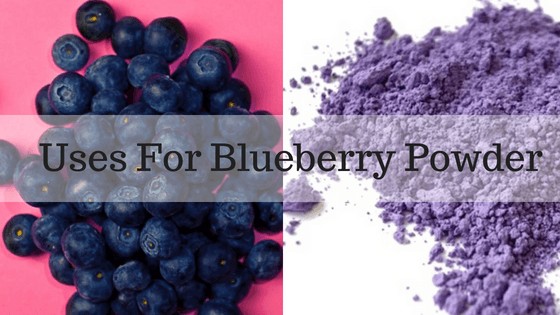Blueberry powder is a food storage item that can replace traditional blueberries in many recipes. It is a perfect item to have on hand for a healthy option when an emergency arises.
In this article I will cover what blueberry powder is, the benefits, and offer some blueberry powder recipe ideas.
What is Blueberry Powder?
Blueberry powder is a nutritional supplement you can use instead of fresh blueberries.
The powder is derived from freeze-dried, wild organic blueberries. The berries are squeezed and extracted during the low thermal method. That is what freeze-dries all the parts of the berries, including skin, pulp, and seeds.
The freeze-drying process preserves all the nutrients you find in fresh berries. The respected nutritional supplement manufacturers will always use grown blueberries and produce a preservative-free powder.
You can use blueberry powder instead of fresh or frozen blueberries for your favorite blueberry pancakes!

How to Find the Best Blueberry Powder?
Many companies manufacture blueberry powder, one of the first things to look at is the color of the powder.
Blueberry extract powder should have a dark blue or purple color, like real berries.
Below are some additional tips to finding the best blueberry powder:
- Check the company’s reputation.
- Review the ingredient or nutrition information, it should be short with no preservatives like maltodextrin. You want 100% natural ingredients.
- Wild or organic blueberries are preferred as they have more nutrients.
- A reliable manufacturer will test their products for toxic metals. This is done in-house, or they may contract a third party to test for metals and other harmful substances.
You can ask for toxic metal test results if you have a concern. A nutritional supplement company that follows Good Manufacturing Practices, GMP can provide proof of the quality and purity of their product.
One brand that gets amazing reviews and seems to meet all of the above requirements is LOOV Organic Wild Blueberry Powder.
Benefits of Powdered Blueberries
You only need between a teaspoon and a tablespoon of blueberry powder a day, to get its full nutritional value. A tablespoon of powder gives you the same vitamins and antioxidants, which is equivalent to a half-cup of fresh blueberries.
Many people choose to use powered blueberries instead of fresh blueberries since fresh blueberries do not last all that long.
The shelf life of powdered blueberries is much longer than fresh ones. If you lead a busy life, you may not have time to eat fresh blueberries before they “go bad.” The best powders have a shelf life of 12 to 18 months if kept in an airtight container in a dry kitchen cabinet.
You can use this fruit extract anytime, but many people use it after a workout. It’s like adding a protein powder to their morning smoothie. It is with or without other fresh or powdered ingredients. Most manufacturers of blueberry extract powder recommend you to use between one and three teaspoons of the powder a day, however, If you have a chronic medical condition, ask your doctor if it is safe to use this amount (or more) daily.
Side Effects of Consuming Blueberry Powder
If you take warfarin, or another prescription blood thinner, you may want to check with your doctor before consuming more blueberries, either in fresh or powdered form.
The high amount of Vitamin K in blueberries may interfere with blood clotting. If the blueberry extract powder has additional herbal ingredients, it is sometimes called a proprietary blend. Make sure you aren’t allergic to any of the ingredients.
Small amounts of grapeseed, or other ingredients, can be harmful if you are allergic to them.
Blueberry powder nutritional value
It’s no surprise that nutritionists hail blueberries.
It is one of the most nutritious fruits you can eat. A cup of blueberries contains 32% of the recommended daily value of Vitamin K and also contains fiber, copper, and manganese.
It blasts antioxidants called phytonutrients, which aid in fighting many diseases. The types of phytonutrients in blueberries include:
- Quercetin
- Catechin
- Kaempferol
- Gallic acids
- Resveratrol
- Pterostilbene
Green tea contains catechins, apples have quercetin, and broccoli has kaempferol. So, you can get each of these things in different foods, but blueberries are a powerhouse that have them all.
The powdered version contains the same or similar nutrients, depending on the manufacturer.
Blueberries and their powdered version, have a high Oxygen Radical Absorbance Capacity (ORAC) value. The ORAC scale measures a food’s ability to absorb and destroy harmful free radicals. Blueberries contain anthocyanins, which are flavonoids that may protect against cancer.
According to several studies, they can also help with cardiovascular disease and dementia. The anthocyanins, and other nutrients in powdered blueberries, neutralize toxins.
These are the chemicals that protect your brain and heart against plaque formation. If you have certain health issues or are trying to avoid developing diabetes or other chronic problems, this powdered fruit can help with those.
It can also help to prevent and treat urinary tract infections, as well as aid in the prevention of other medical conditions, including:
- Improved circulation
- Better eyesight
- Anti-aging properties
- Reduction in arthritis pain
- Protects against diabetes and hypoglycemia
- May prevent cancer
How blueberries protect your health
Now that you know more about what health problems can be treated, you understand how blueberries can aid in protecting you.
Here’s some background on how they guard against other specific illnesses.
Powdered blueberries help with diabetes
Blueberries, and powder made from wild blueberries, have a low Glycemic Index (GI). Foods with a low GI have slow-working carbohydrates, which are digested and metabolized, without causing a spike in blood sugar.
Low GI food will give you a barely perceptible rise in blood glucose and insulin. These berries have a GI index of 53 for a 150-gram (2/3 cup) serving.
Any food with a GI of 55 or below, is in the low GI range and is considered suitable for people with diabetes, or people just trying to control their blood sugar.
Blueberries are good for brain health
Studies have shown that blueberries help reduce or prevent age-related cognitive decline and dementia.
A British study indicated that older adults who drank blueberry juice daily for 12 weeks, had improved blood flow to the brain and scored better on cognitive tests.
If blueberry extract powder and blueberries can improve working memory in older adults, it can certainly boost younger people’s memory and cognitive function.
Blueberries aid in preventing urinary tract infections
You’ve heard about cranberry juice as a deterrent to UTIs?
The polyphenols in blueberries work just as well.
The bacteria-fighting qualities in polyphenol antioxidants help to give your urine a high pH level. It causes it to become more like water, more practically neutral. When urine has a higher pH, it binds to iron better to reduce the chance of UTIs.
4 Easy Blueberry Powder Recipe Ideas
You can use blueberry powder in just about anything that needs blueberries, but below are a few recipe ideas to get you started. These are not step-by-step recipes, but inspiration on how to use the powder.
When substituting extract powder for blueberries in recipes, try to remember that a tablespoon of powder is equal to a half-cup of blueberries.
1. Smoothies with Blueberry Powder
You’ll avoid the mess and expense of using fresh blueberries by using an extract powder. Still, you’ll get the same fresh taste. Replace fresh berries with powder in any smoothie recipe that calls for blueberries.
Blueberry Almond Butter Smoothie
Use a banana, organic blueberry powder, almond butter, and almond milk to a blender and enjoy. Add chia or flax seeds to add additional Omega 3 fatty acids.
Blueberry Cranberry Smoothie
Use kefir instead of yogurt, which gives you plenty of polyphenols to fight UTIs. Puree a banana, cranberries, blueberry extract powder, and kefir until the mixture is smooth.
Blueberry Milkshake
Folks who like old-fashioned milkshakes made with vanilla ice cream, or whole milk, can add blueberry extract powder for flavor and nutrition, without adding too many calories.
2. Cakes and Muffins Using Blueberry Powder
Add powdered blueberries to dry muffin or cake mix; then add water, milk, and other wet ingredients and mix. If you’re baking a cake from scratch, you can use frozen blueberries with the powdered extract. You can use a few fresh blueberries as a topping or put a few in the batter.
You can also add blueberry powder to icing for cakes. You can add homemade granola mix to cupcakes instead of sugar.
Remember not to add too much powder or too many blueberries to any one recipe. Although there’s little danger of “overdosing” on blueberries or blueberry extract, there is a chance that you could encounter digestive issues because of the high fiber content.
3. Blueberry Pancakes
Most people enjoy blueberry pancakes or waffles for breakfast once in a while. If you add blueberry extract powder to your pancake mix. You’ll get the same taste and nutrition as regular blueberry pancakes, without the fruity speckles. Enjoy!
4. Oatmeal & Yogurt
You can stir powdered blueberries in your morning oatmeal or add it to yogurt. For extra nutrition, add nuts, which are loaded with Omega 3 fatty acids, to your healthy breakfast.
Unfortunately, if you like fruit salads, powdered blueberry extract won’t help you there.
You would need to use the real thing in salads as well. You can experiment with blueberry extract powder in most baked goods you make from scratch. This includes blueberry-banana bread, beverages, and even blueberry soup.
Becky is a wildlife enthusiast and pet and livestock care expert with a diploma in canine nutrition. With over a decade of experience in animal welfare, Becky lends her expertise to Simple Family Preparedness through insightful info about pets, livestock, bee keeping, and the practicalities of homesteading.

